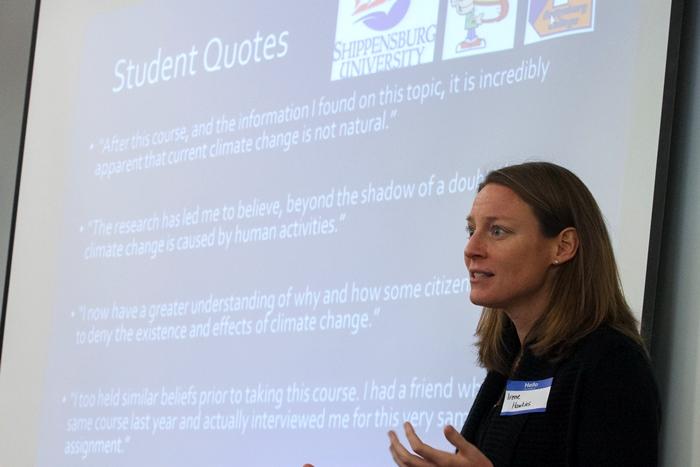Climate in the Classroom

Photo by Carl Socolow '77
Dickinson hosts daylong examination of how climate change is taught
by Tony Moore
Dickinson recently hosted its last workshop as a part of Cooling the Curriculum: A Campaign for Climate Change Education in the Liberal Arts, a four-year project that included partner institutions educating more than 100,000 students per year.
Born of a $500,000 grant from NASA's Innovations in Climate Education and a coalition between Dickinson and four regional community colleges—Montgomery College and Montgomery County, Harrisburg Area and Northampton community colleges—the program's final workshop focused on methods of teaching climate change in the classroom.
"There seems to be a lot of faculty hungry to get together and talk about teaching, teaching that cuts across their specific disciplines," said Neil Leary, director of the Center for Sustainability Education (CSE), which spearheaded Cooling the Curriculum and hosted the event.
With three overarching topics—engagement, behavior and action; pedagogies for teaching climate change; and science, science literacy and skepticism—serving as the backbone of the event, the day was set up differently than previous Cooling the Curriculum events.
While previous workshops were weeklong events run by Dickinson faculty members and invited guests, this time invitees were asked to create and deliver presentations on their pedagogic processes—what they're teaching, what's working, what's not working—to provide a broader, multidisciplinary perspective. Common to their methods and courses is the goal of building the climate literacy of their students so that they can act as informed, responsible citizens.
"There were librarians, computer scientists, chemists, biologists, earth scientists, English professors, psychologists, people from museum studies," said Lindsey Lyons, assistant director of CSE, noting that 24 colleges and universities were represented. "It's unique to have people from this range of disciplines coming together to talk about teaching strategies."
The workshop may have been the last of Cooling the Curriculum, but it's likely to represent a jumping-off point rather than the end of the discussion.
"The response was so quick and large that we think we should run a workshop every January," said Leary. "We might try climate change as the topic again, or maybe we'll change it up each year."
Published January 13, 2014